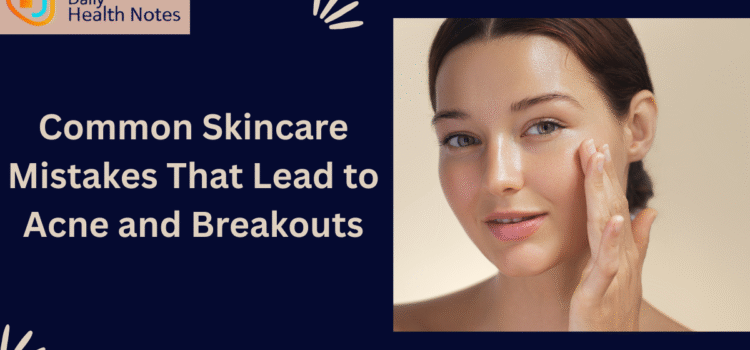
Why Your Skincare Routine Might Be Causing Breakouts
We all know the feeling: you’ve been diligently following your skincare routine, only to wake up to an unexpected breakout. While skincare products and routines are designed to improve your complexion, sometimes the opposite happens, leaving you frustrated and confused.
The truth is, many of us unknowingly make mistakes in our skincare routines that can lead to breakouts, irritation, and other skin issues. Whether you’re using the wrong products, not cleansing properly, or over-exfoliating, these errors can trigger acne and worsen your skin’s health.
In this article, we’ll break down the common skincare mistakes that cause breakouts and provide solutions to help you achieve clear, healthy skin. Let’s dive into the missteps that might be sabotaging your skincare efforts.
Common Skincare Mistakes That Cause Breakouts
1. Skipping Sunscreen or Using the Wrong SPF
One of the most significant skincare mistakes that can lead to breakouts is not using sunscreen or choosing the wrong one for your skin type. While sunscreen protects your skin from harmful UV rays, it can also help prevent acne flare-ups caused by sun exposure. Unfortunately, many sunscreens contain ingredients that clog pores, leading to unwanted breakouts.
- Solution: Option for non-comedogenic sunscreens (formulated not to clog pores) with broad-spectrum protection and SPF 30 or higher. There are plenty of sunscreens on the market that are specifically formulated for acne-prone skin.
2. Over-Cleansing or Under-Cleansing Your Skin
Cleansing is vital to your skincare routine, but over-cleansing or under-cleansing can trigger acne. Over-cleansing can strip the skin of its natural oils, causing it to produce even more oil, which can lead to clogged pores and breakouts. On the other hand, not cleansing properly can leave dirt, makeup, and oil on the skin, promoting the growth of acne-causing bacteria.
- Solution: Cleanse your skin twice a day using a gentle, sulfate-free cleanser suited for your skin type. Avoid harsh scrubbing and overly drying cleansers, which can irritate the skin.
3. Using Products with Harsh Ingredients
Many skincare products contain harsh ingredients that can irritate and damage your skin, triggering breakouts. Ingredients like alcohol, fragrances, and synthetic dyes can cause inflammation, leading to clogged pores and acne flare-ups.
- Solution: Look for products with gentle, hydrating ingredients like hyaluronic acid, glycerin, and ceramides. Avoid products with alcohol and synthetic fragrances, especially if you have sensitive skin.
4. Over-Exfoliating Your Skin
Exfoliation helps remove dead skin cells and prevent clogged pores, but over-exfoliating can be harmful to your skin. Scrubbing too harshly or using exfoliants too frequently can cause inflammation, leading to redness, irritation, and breakouts.
- Solution: Stick to exfoliating once or twice a week with a gentle exfoliant, and avoid abrasive scrubs. Consider using chemical exfoliants like AHAs (alpha hydroxy acids) or BHAs (beta hydroxy acids), which are more effective and less harsh than physical scrubs.
5. Touching Your Face Frequently
It’s easy to forget, but touching your face can transfer bacteria, oil, and dirt from your hands to your skin, causing clogged pores and breakouts. This is particularly true if you’re dealing with acne-prone skin.
- Solution: Be mindful of how often you touch your face. Wash your hands regularly and avoid resting your face on your hands. Use a clean towel or cloth to wipe your face when necessary.
6. Not Removing Makeup Before Bed
It’s tempting to leave your makeup on at the end of a long day, but sleeping with makeup on can clog pores and contribute to breakouts. Foundation, concealer, and mascara trap dirt and oil, leading to skin congestion and acne.
- Solution: Always remove your makeup thoroughly before bed. Use a gentle makeup remover followed by your usual cleanser to ensure that your skin is completely clean before sleep.
7. Using Products with Too Many Active Ingredients
Active ingredients like retinol, salicylic acid, and benzoyl peroxide are powerful tools in acne treatment. However, using too many of them simultaneously can overwhelm your skin, leading to dryness, irritation, and breakouts.
- Solution: Introduce active ingredients one at a time and use them in moderation. If you’re using a treatment for acne, avoid combining too many harsh ingredients at once, and consult a dermatologist for personalized recommendations.
8. Not Moisturizing Enough
While it might seem counterintuitive, not moisturizing your skin can actually lead to more breakouts. When your skin becomes dehydrated, it may compensate by producing excess oil, which can contribute to clogged pores and acne.
- Solution: Use a lightweight, oil-free moisturizer daily to keep your skin hydrated and balanced. Even if you have oily skin, moisturizing is essential to keep your skin healthy.
Expert Opinions and US-Centric Statistics
According to the American Academy of Dermatology (AAD), acne is one of the most common skin conditions in the U.S., affecting over 50 million Americans each year. The majority of individuals experience acne during their teenage years, but it can persist into adulthood, especially for women in their 20s and 30s.
An estimated 85% of people between the ages of 12 and 24 experience at least some form of acne, with many seeking professional treatments like topical creams, oral medications, and laser therapies. However, lifestyle factors, including poor skincare habits, can significantly contribute to acne outbreaks.
How to Fix Your Skincare Routine and Prevent Breakouts
To avoid the common skincare mistakes that cause breakouts, consider implementing these tips:
- Start with a basic skincare routine: Focus on cleansing, moisturizing, and applying sunscreen.
- Know your skin type: Choose products that are specifically designed for your skin type, whether it’s oily, dry, combination, or sensitive.
- Consult with a dermatologist: If you’re struggling with persistent breakouts, a dermatologist can offer tailored skincare recommendations and prescribe effective treatments.
- Be patient: Skin improvements take time. Avoid the temptation to overdo it with new products or treatments.
Conclusion: Achieving Clear, Healthy Skin
Achieving clear, breakout-free skin doesn’t have to be a mystery. By avoiding common skincare mistakes like skipping sunscreen, over-exfoliating, or using harsh products, you can create a skincare routine that works for you. Remember, consistency and patience are key when it comes to skincare.
By making a few small changes to your routine, you’ll be well on your way to healthier, clearer skin. If you’re struggling with persistent breakouts, don’t hesitate to consult with a skincare professional for personalized advice.












